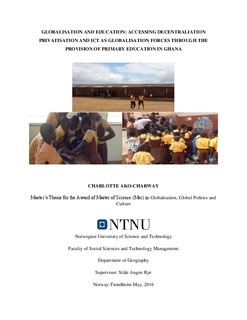| dc.description.abstract | Globalisation has brought about immense inter connection of states as well influence on their economic, political, social and education systems. Many countries both developed and developing at a point in time been faced with the surge to restructure their education system due to the current increase of globalisation forces that is affecting all aspects of human life. Some of these changes generated by globalisation are established through international policies and awareness. Mostly, these policies are geared towards improving the education system and to enhance quality outcomes so as to prepare citizens for the global economy. This study examines different educational stakeholders’ perspectives on ICT, decentralisation and privatisation as globalisation forces for education including other issues related to globalisation and education. The principal focus was on primary education as it is critical to developing an individual in the early stage of educational life.
The study data was obtained from Nsawam, in the Eastern Region and some areas in Accra, the capital city of Ghana. Qualitative data collection techniques such as structured and semi-structured interviews, focus group discussion and observations were used to collect data from forty-two (42) research participants which included government officials, head-teachers, parents and teachers. The theoretical framework adopted was the globalisation theory with perspectives on decentralisation and privatisation. The general findings of this suggested that, educational stakeholders are aware of the process of globalisation but have not come to understand the impact it has on education. Whiles part of the stakeholders conceded to the opportunities it has for education, the rest only looked to the challenges it has for primary education in Ghana, although nearly all admitted that globalisation forces such as privatisation and ICT has a link with quality education. Finally, the study revealed that there are both positive benefits and challenges that can be associated to the impact of globalisation on education. Therefore Ghanaians ability to develop policies to offset the challenges to enhance quality, especially for primary education has some lessons for other developing countries. | nb_NO |
